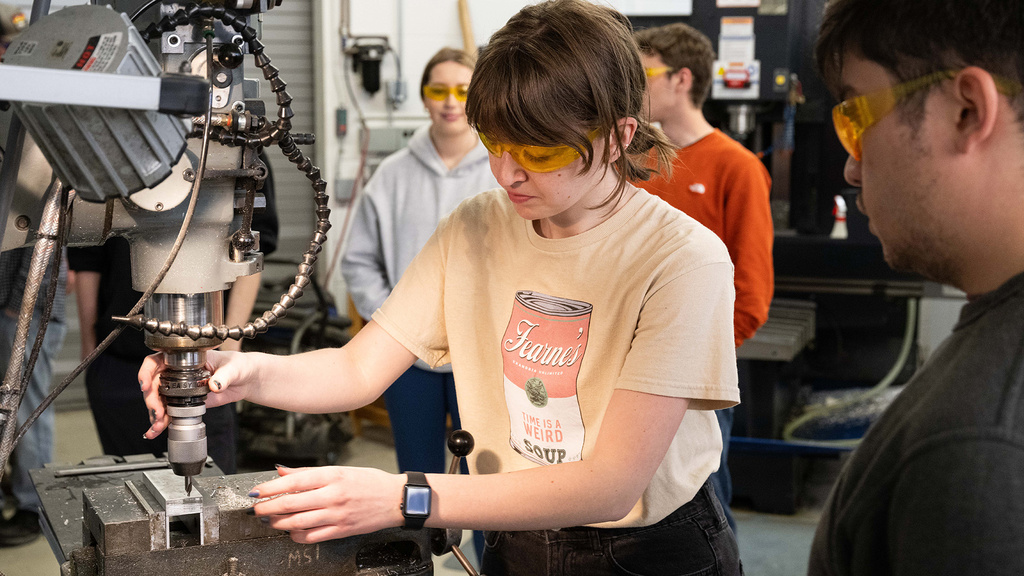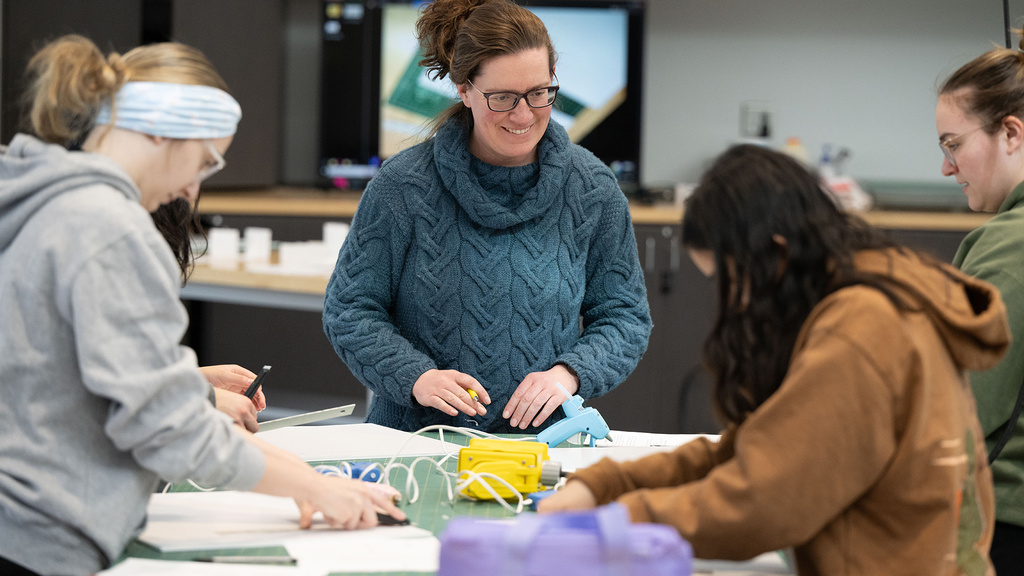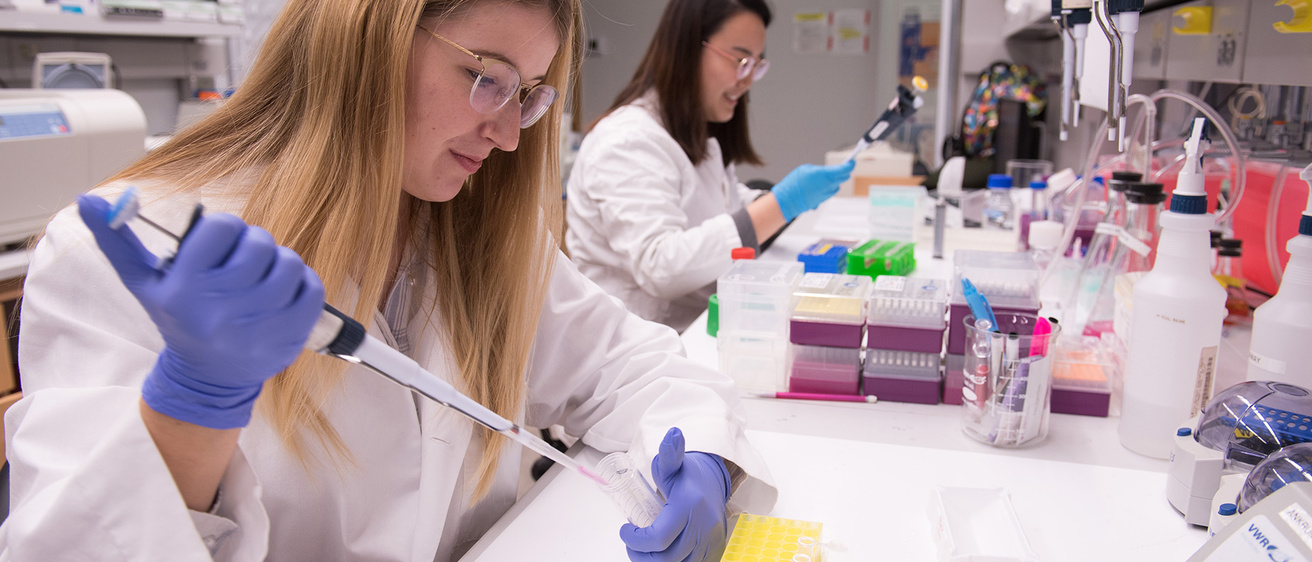Let’s talk about what you need to do to get into a biomedical engineering degree program, and what you’ll need to do to get that degree.
Biomedical engineering blends science, technology, and problem-solving to improve human health. Sounds rewarding, doesn’t it? If you’re considering this career path, it’s important to understand biomedical engineering degree requirements, both in terms of preparations you should make in high school and how much schooling makes sense for your career goals.
Let’s start with what you can do before you ever set foot on a college campus.
What are the admission requirements for biomedical engineering?
The path toward becoming a biomedical engineer starts well before college. High school students should focus on building a strong foundation in math and science. Advanced coursework in algebra, calculus, physics, chemistry, and biology is essential — these subjects are the backbone of engineering education.
“In high school, it is important to take as many math and science classes as possible,” says Josh Atcher, director of academic advising and student support in the University of Iowa College of Engineering. “In terms of math, take pre-calculus at the very least, and move on to calculus and go as far into that math sequence as you can.”
When it comes to university admission, students must meet general undergraduate entry requirements, which can include standardized test scores (ACT or SAT); high school transcripts documenting a minimum number of courses in math, science, English, world language, and social studies; and letters of recommendation.
Your grade-point average — and how you’ve done in foundational courses — can play a role in admission as well. For example, when the University of Iowa evaluates GPA for direct admission to the College of Engineering, an emphasis is placed on grades in math and science coursework.
Many engineering programs also look for evidence of strong analytical and critical-thinking skills. Participation in STEM clubs, robotics teams, or science fairs can strengthen applications while demonstrating problem-solving skills.
If you’re researching next steps, be sure to explore detailed biomedical engineering degree requirements for the University of Iowa and other institutions to confirm prerequisites and expectations.
Iowa’s requirements
First-year students who meet the engineering admission requirements are admitted directly to the University of Iowa College of Engineering. Students can choose whichever engineering major interests them and can switch majors easily if their interests change.
The requirements:
You need a minimum Regent Admission Index score. We hear your next question already: What is a Regent Admission Index score? This calculation factors in your GPA, your ACT/SAT score, and the number of core courses you took in high school.
You also must meet specific high school course requirements. For engineering, that means four years of English, four years of mathematics, three years of science, two years of social studies, and two years of the same world language.
How many years does it take to be a biomedical engineer?
A standard undergraduate biomedical engineering degree typically takes four years to complete. During this time, students progress through general education courses, foundational math and science classes, and specialized engineering courses that build toward advanced design and research projects.
For some, internships or co-ops can extend that timeline a little bit. You should weigh the pros and cons — yes, it can add a few months or a year to your academic journey, and, yes, you can gain some amazing real-world skills. Only you can decide what’s best for you.
With that in mind, you could seek out biomedical engineering students or grads who’ve gained this professional experience and ask them if they found it worth the time or whether they felt it strengthened their résumé.
Another factor that can stretch the timeline beyond four years is whether you want to pursue an advanced degree (a master’s or a PhD). Advanced degrees often are valuable — if not flat-out required — for research-intensive positions, teaching roles, or leadership careers in academia and industry. (If you’re specifically curious about advanced degrees, we have articles that delve into whether it’s worth pursuing a master’s degree in biomedical engineering and pursuing a PhD in biomedical engineering.)
Altogether, the total time it takes to become professionally established varies based on specialization, but most students begin working in the field after earning their undergraduate degree.
What should I major in to become a biomedical engineer?
This should come as no surprise: The most direct route is to earn a biomedical engineering bachelor’s degree. This program will equip you with specialized skills at the intersection of biology, medicine, and engineering design.
“One reason students major in biomedical engineering is because they want to help people,” says Kim “Avrama” Blackwell, professor and departmental executive officer of biomedical engineering at the University of Iowa. “Biomedical engineering grads do this in many ways: by designing a new medical treatment, developing medical equipment that improves mobility, or designing a new imaging machine that leads to better diagnoses.”
Majoring in biomedical engineering is not the lone path, of course. Interdisciplinary routes can provide competitive advantages by merging biomedical expertise with broader engineering applications. Degrees in mechanical engineering, electrical engineering, or chemical engineering can lead to biomedical careers, particularly when paired with electives or concentrations in biomedical applications. For example:
- Mechanical engineering students might focus on biomechanics or prosthetics.
- Electrical engineering students could specialize in medical imaging or biomedical instrumentation.
- Chemical engineering students often explore drug delivery systems or tissue engineering.
That’s not to say a biomedical engineering degree isn’t flexible. Biomedical engineering programs’ curriculum will prepare you for jobs that require strong analytical skills.
“One skill that every engineer gains is the ability to solve problems,” says Andy Leopold, University of Iowa biomedical engineering alum (1984) who co-founded Medical Murray, a contract development and manufacturing organization for minimally invasive medical devices and implants. “That’s probably a reason you are interested in the field in the first place, right? You love to tinker. You’re methodical about things; you have a process. You will develop and refine these traits in every engineering class you’ll take, and biomedical engineering is no exception. You’ll apply these skills in whatever career you pursue, at whatever job you land.”
What classes do I need for biomedical engineering?
The courses you take will hinge on your program’s curriculum. Many programs will have specific tracks or concentrations — if you already know which direction you want to go, you can choose classes that satisfy that area, be it biomaterials, medical device design, medical imaging, or any other option on offer.
And if you’re not sure? Don’t panic. Use the first year or two to explore tracks until you zero in on the path you want to take. Students often gravitate toward a particular focus based on interests they discover through their foundational courses.
“Once you’ve decided on biomedical engineering, keep an open mind,” says Nicole Grosland, associate dean for academic programs and distinguished professor in the University of Iowa College of Engineering. “Think about what excites you. Do you like coding? Mechanics? Biology? These interests will help guide your exploration. Also consider job prospects and whether you want to work in industry, research, or health care.”
Regardless of program, you’re looking at completing courses in math (yes, there is a lot of math), physics, chemistry, biology, engineering fundamentals, and specialized biomedical courses, along with lab and design experiences. It’s a challenging curriculum — just know that the hard work yields invaluable skills.
“Applying what we learn comes down to being able to synthesize a lot of information to come up with solutions,” says Kelsey Lyons, an Iowa biomedical engineering grad now in med school at Georgetown University. “I got so much practice with that as a biomedical engineer.”

“Think about what excites you. Do you like coding? Mechanics? Biology? These interests will help guide your exploration.”
FAQ: Requirements for biomedical engineering
What classes should I take while in high school if I’m interested in biomedical engineering?
High school students interested in biomedical engineering should focus on building a strong foundation in math and science. Helpful courses include calculus or advanced math, biology, chemistry, and physics. Computer science, engineering, or robotics can also be beneficial, as they introduce problem-solving and technical skills used in biomedical engineering programs. Developing strong study habits and analytical thinking skills in high school can make the transition to a rigorous engineering curriculum smoother.
What types of biomedical engineering degrees are available?
Types of biomedical engineering degrees include a bachelor’s degree, master’s degree, or PhD. A bachelor’s degree prepares graduates for entry-level engineering or health care technology roles, while master’s and doctoral programs allow for deeper specialization, research, and leadership opportunities.
What can you do with a biomedical engineering degree?
Biomedical engineering graduates work in medical device design, health care technology, research and development, quality assurance, regulatory affairs, and clinical engineering. Many also pursue careers in consulting, entrepreneurship, or healthcare innovation.
Is biomedical engineering a good career choice?
Biomedical engineering is considered a strong career option due to its interdisciplinary nature and relevance to health care and technology. The field combines engineering problem-solving with real-world medical applications, offering diverse and impactful career paths.
Is graduate school necessary for biomedical engineering careers?
Graduate school is not required for all biomedical engineering jobs, but a master’s or PhD can expand career options and earning potential. Advanced degrees are especially valuable for research-focused positions, academic careers, or highly specialized technical roles.
Can you go to medical school with a biomedical engineering degree?
Biomedical engineering is a popular degree for students bound for medical school. It includes many required medical school prerequisites while also developing analytical and problem-solving skills that are useful in medicine.
Related content

Biomedical engineering degree requirements: What you'll need, from start to finish

How long does a biomedical engineering degree take?

